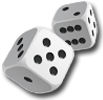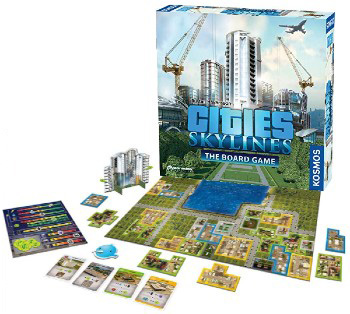



play board games
Board game reviews, strategy tips & session reports
Cities Skylines Board Game Review
 Stats:
Stats:
No. of players: 1-4
Amount of time to play: 70 min
Age requirements: 10+
Set-up time: 5 min
Cities Skylines is a cooperative board game about city planning and development. Can you make an awesome city whose inhabitants gush with pride?
Cities Skylines Rules Description:
Your main goal in Cities Skylines is having a high happiness rating after completing a certain number of milestones (depending on the scenario you are playing). You start with a hand of Construction Cards and some cash in your treasury.
The board is made up of face-down tiles that you must pay to flip over. You start the game paying to have one of the tiles face up. On your turn you play Construction Cards to place building tiles on the board. Some building cost money, but others decrease energy, water, or trash collection. Others increase your traffic, crime rate, or pollution. If you don’t have the money or can’t increase or decrease these items on your administration board, you can’t place the building.
Placing a building can have some good effects especially when build with specific service buildings nearby. For example, a residential area can increase your population, but drop your power and if built it in an area with a school you gain you one happiness. Constructions cards for placed buildings are removed from the game.
At the end of your turn you draw a new card to replenish your hand. You can pick from cards for Stage 1, 2, or 3. The higher the number the better the card’s benefits, but the cost also increases.
The game progresses through milestones. In order to reach a milestone you must have at least one building in each area of your current tile and the funds to pay to flip the next tile. The last milestone ends the game and requires at least two buildings in each area of the entire board. Upon reaching a milestone you may pay $2 each to swap or draw new cards.
Once you meet the requirements, you choose when you reach a milestone. Upon reaching it you add your current happiness to the scoreboard. But you must first subtract happiness for insufficient power, water, and trash collection. You must also pay $1 for every level above or below zero your population is. At the end of the game you must also subtract happiness for each level of crime, traffic and pollution.
There are also unique buildings, role cards, policies cards and news cards. Unique buildings take up space but offer you an ongoing bonus. Role cards give each player a unique special ability. Policies cards grant you a one-time bonus. News cards give you a disadvantage and only go away when another one is drawn or you proceed to the next milestone. These cards are introduced in one of four scenarios.
At the end of the game there is a chart with total happiness scores. You can look there to see just how successful you were. Although this is a cooperative board game you can lose. If you run out of money, have excessively low happiness, or a player cannot play a card on their turn you lose.
Quick Review of Cities Skylines:
Cities Skylines is a fun cooperative puzzle game. It is based on a computer game, which I must admit, I have not played. You must manage your resources, fit the building tiles on the board, and get lucky to do well.
The components for the game are pretty good. The art is fine and the iconography is easy to understand. My only complaint is the building tiles punch out with small nubs on them. This can be a problem when you need to interlock some buildings. The nubs can get in the way. This is not too big a deal but might be something that was overlooked. The rulebook has four scenarios that start with the basics rules and add a new rule each game. This helps the learning curve and lets you modify the complexity based on your gaming group.
The puzzle aspect of this game is very enjoyable. Trying to place buildings in the right sequence, combined with actually having to fit them onto the board, is fun and creates some interesting (and sometimes tough) decisions.
You also must choose which pile you want to select from when you draw a card. When is it best to claim the next milestone? All these decisions matter and can create some meaningful (and sometimes stressful) moments.
There are some different board configurations you can try and ways to increase the difficulty too. This helps add more replay value to the game.
The game can be frustrating when you don’t draw cards you need. The random drawing of cards might just dictate a bad game and failed city. Part of the challenge of this board game is working around that randomness, but know there might be a game now and again when you can’t.
Like many cooperative board games, one or two dominant players can quarterback this game. If you have those types of gamers in your group be aware they might take over.
If you like the video game or city-building board games, check out Cities Skyline. It is a fun puzzler that has interesting choices.
Score and synopsis: (Click here for an explanation of these review categories.)
Strategy 3 out of 6
Luck 4 out of 6
Player Interaction 5 out of 6
Replay Value 4 out of 6
Complexity 3 out of 6
Fun 4 out of 6
Overall 4 out of 6

Leave a Reply